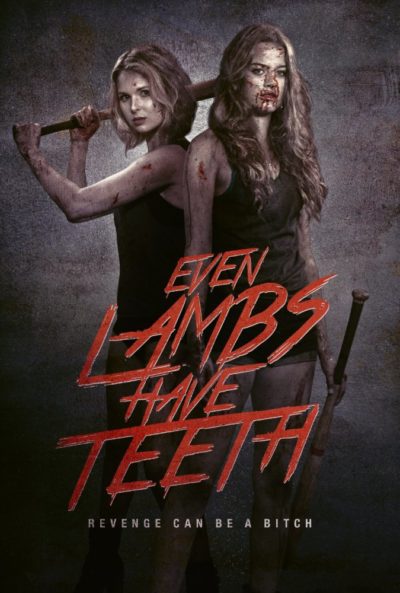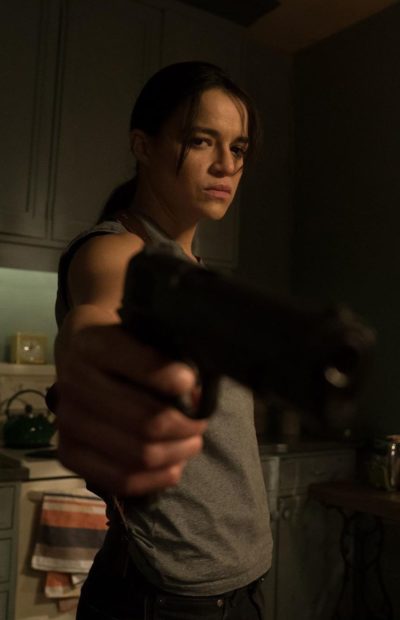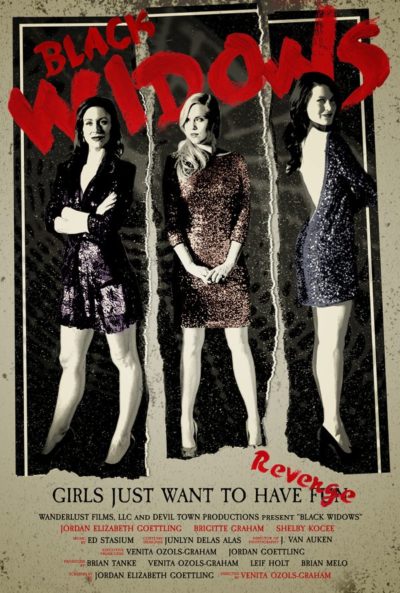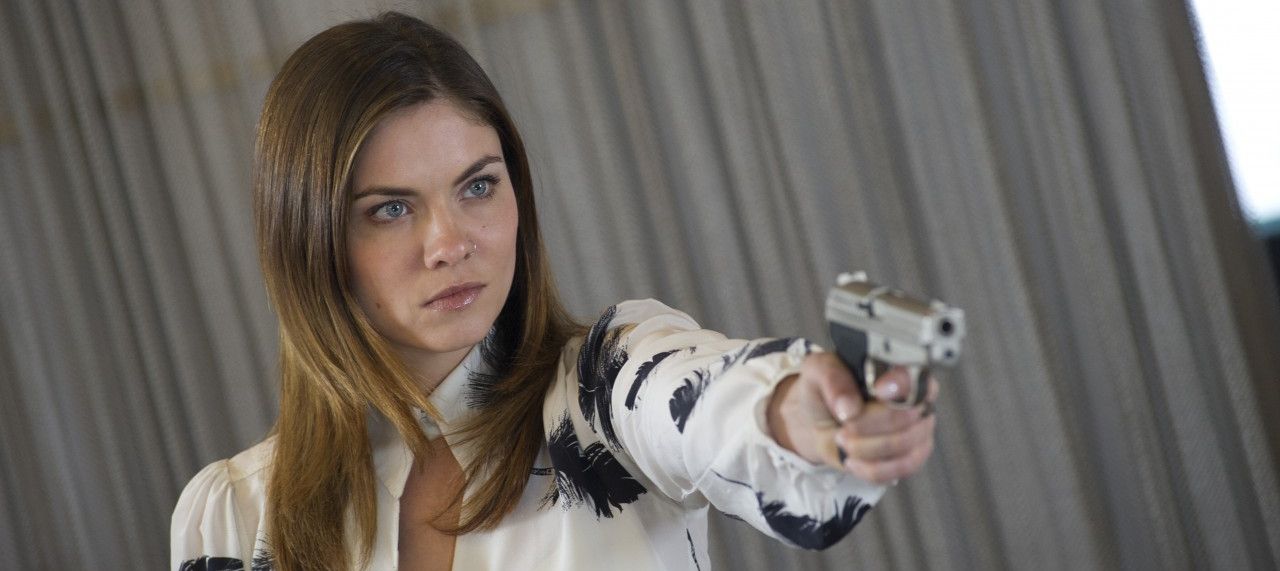★★
“I knew I shoulda taken that left turn at Albuquerque!
 Coming out of the micro-budget scene in New Mexico, this is a straightforward tale of vengeful “hell kittens”, to quote the official synopsis. Bella Meurta (Kate) is a hooker, who kills one of her clients after he gets rough with her. In revenge, her little sister is savagely beaten and left dead [note: not left for dead…] in the street. Bella gathers together her posse to take out the mobsters responsible: stripper Fageeda Cunt (Blackery), dominatrix Silky Gun (Coi), and jailbird turned home healthcare professional Harley Hellcat (Rebelle). [Look, I’m just reporting these character names, I didn’t create them. Particularly Fageeda’s] But as the saying goes, “Before you embark on a journey of revenge, dig two graves.” Or perhaps more, in this case.
Coming out of the micro-budget scene in New Mexico, this is a straightforward tale of vengeful “hell kittens”, to quote the official synopsis. Bella Meurta (Kate) is a hooker, who kills one of her clients after he gets rough with her. In revenge, her little sister is savagely beaten and left dead [note: not left for dead…] in the street. Bella gathers together her posse to take out the mobsters responsible: stripper Fageeda Cunt (Blackery), dominatrix Silky Gun (Coi), and jailbird turned home healthcare professional Harley Hellcat (Rebelle). [Look, I’m just reporting these character names, I didn’t create them. Particularly Fageeda’s] But as the saying goes, “Before you embark on a journey of revenge, dig two graves.” Or perhaps more, in this case.
The aim is clear here, with West looking to create (yet another) throwback to the days of grindhouse and straight-to-rental action flicks. Which explains the faux artifacts like film scratches, I guess – though since it’s clearly shot on video, you kinda wonder why they bothered. Unfortunately, the execution falls a bit short as well. Cheap, I can easily forgive; it’s the occasional sloppiness here that’s annoying. For instance, when we see little sis lying dead in the road, her corpse is in pristine condition. Then, when Bella shows up in the next shot, the body is suddenly blood-spattered and badly bruised. Having a low-budget is no excuse for glaring continuity gaffes such as that.
Even at barely an hour long, there feels like there are significant chunks of padding, such as scenes of Fageeda and Silky at “work”, which bring plot development grinding to a complete halt. Particularly in the second half, the plot seems herky-jerky, with scenes in utterly different locations next to each other, lacking any explanation of how or why the characters went from Point A to Point B. There’s also a weird, almost complete lack of anyone over the age of about 30, which makes this seems like a revenge-based remake of Logan’s Run. And it appears most of the lead actresses are local burlesque dancers. The Venn diagram of the skills needed for those professions is not two superimposed circles, shall we say.
Yet I can’t say I hated this. We’ve been involved with enough low-budget film-making to be able to appreciate what’s involved, and much of the same vibe is present here. There are enough moments of quirky eccentricity, such as the Russian mobster confused by an ignition interlock device, which kept me adequately entertained through the film’s slacker moments. The fight scenes – something we always found a nightmare to try and make look even half way to good – didn’t entirely suck. You certainly will need a high degree of tolerance for ultra-cheap independent cinema to get through this, and I wouldn’t recommend it for beginners in that genre. Yet, I’ve seen worse [much worse, trust me on that], and despite the flaws, have to acknowledge the obvious effort involved.
Dir: Mikel-Jon West
Star: Intoxi Kate, Joy Coy, General Blackery, Holly Rebelle





 Ann Willis (Robbins) is a single mother, working as a waitress and trying to keep family together after the death of her husband from lung cancer. To help out, son David (Abrahamson) abandons his plans to attend college and gets a job in a local factory. But he falls in with some questionable company there and, lured by the prospect of easy money, starts dealing drugs for the local mobsters, run by Canarsie. Things go from bad to worse after his supposed “friend” Mike (Falahee) frames him for the disappearance of some product, and things end with David’s dead body floating in the river, having been beaten to death by his associates. The cops, and in particular, Detective Frank Hogan (Baldwin), investigate – but to be honest, aren’t particularly interested in one drug-dealer being killed.
Ann Willis (Robbins) is a single mother, working as a waitress and trying to keep family together after the death of her husband from lung cancer. To help out, son David (Abrahamson) abandons his plans to attend college and gets a job in a local factory. But he falls in with some questionable company there and, lured by the prospect of easy money, starts dealing drugs for the local mobsters, run by Canarsie. Things go from bad to worse after his supposed “friend” Mike (Falahee) frames him for the disappearance of some product, and things end with David’s dead body floating in the river, having been beaten to death by his associates. The cops, and in particular, Detective Frank Hogan (Baldwin), investigate – but to be honest, aren’t particularly interested in one drug-dealer being killed. Katie (Skovbye) and Sloane (Prout) are teenage BFF’s, who head off to spend time on an organic farm – though their real goal is the weekend shopping in New York which will follow it. On the way, they are distracted by a couple of bits of prime young, rural manhood. But before you can say “roll in the hay,” they are drugged, the pair waking up to find themselves chained to duplex shipping containers, from where they are rented out as sex slaves to anyone interested. Their sudden dropping off the grid concerns Katie’s uncle Jason (Richards), who happens to be an FBI agent. He heads to the area to investigate, unaware the local sheriff is in on the plot. However, there’s only so far you can push a person, before they break. When Katie and Sloane snap, and escape, rather than heading for safety, they decide to stick around, so they can get thoroughly medieval on those responsible.
Katie (Skovbye) and Sloane (Prout) are teenage BFF’s, who head off to spend time on an organic farm – though their real goal is the weekend shopping in New York which will follow it. On the way, they are distracted by a couple of bits of prime young, rural manhood. But before you can say “roll in the hay,” they are drugged, the pair waking up to find themselves chained to duplex shipping containers, from where they are rented out as sex slaves to anyone interested. Their sudden dropping off the grid concerns Katie’s uncle Jason (Richards), who happens to be an FBI agent. He heads to the area to investigate, unaware the local sheriff is in on the plot. However, there’s only so far you can push a person, before they break. When Katie and Sloane snap, and escape, rather than heading for safety, they decide to stick around, so they can get thoroughly medieval on those responsible. Yoga instructor May (Biel) is delighted when she finally tracks down her long-lost biological sister, Shiva (Mamet) whom she has never met. However, the reunion is soured because May discovers the abusive relationship in which Shiva is embroiled. Worse is to come, as she finds out that Shiva is actually a hooker, and her significant other, Cody (Anderson), is more pimp than boyfriend. May’s efforts to help her sibling run into stormy water – not just from Cody, but also her own boyfriend, Dex (Gathegi) and adopted mother, who think Shiva and Cody are just shaking May down. Eventually, the point comes where May has to come out of this middle-class comfort-zone, because the downward dog position isn’t going to help her and Shiva escape their increasingly perilous situation.
Yoga instructor May (Biel) is delighted when she finally tracks down her long-lost biological sister, Shiva (Mamet) whom she has never met. However, the reunion is soured because May discovers the abusive relationship in which Shiva is embroiled. Worse is to come, as she finds out that Shiva is actually a hooker, and her significant other, Cody (Anderson), is more pimp than boyfriend. May’s efforts to help her sibling run into stormy water – not just from Cody, but also her own boyfriend, Dex (Gathegi) and adopted mother, who think Shiva and Cody are just shaking May down. Eventually, the point comes where May has to come out of this middle-class comfort-zone, because the downward dog position isn’t going to help her and Shiva escape their increasingly perilous situation.
 I’m a big fan of any film with an outrageous premise, and this one certainly delivers. Mob hitman Frank Kitchen (Rodriguez) carries out his latest job with no qualms, killing a debtor. What he doesn’t realize is, the victim’s sister is a talented but EXTREMELY twisted surgeon, Dr. Rachel Jane (Weaver). She vows to take revenge on Frank by removing what she feels matters most to him: his masculinity. Kitchen is knocked out, kidnapped, and wakes up in a seedy hotel room, to find herself in possession of a couple of things she didn’t have before, and missing something she used to have. But gender reassignment does not make the (wo)man, and an extremely pissed-off Frank vows revenge of her own, both on Jane and Honest John Hartunian (LaPaglia), the former employer who betrayed Kitchen.
I’m a big fan of any film with an outrageous premise, and this one certainly delivers. Mob hitman Frank Kitchen (Rodriguez) carries out his latest job with no qualms, killing a debtor. What he doesn’t realize is, the victim’s sister is a talented but EXTREMELY twisted surgeon, Dr. Rachel Jane (Weaver). She vows to take revenge on Frank by removing what she feels matters most to him: his masculinity. Kitchen is knocked out, kidnapped, and wakes up in a seedy hotel room, to find herself in possession of a couple of things she didn’t have before, and missing something she used to have. But gender reassignment does not make the (wo)man, and an extremely pissed-off Frank vows revenge of her own, both on Jane and Honest John Hartunian (LaPaglia), the former employer who betrayed Kitchen. Three women friends – Darcy (Elizabeth), Nora (Graham) and Olivia (Kocee) – are all having shitty luck with their relationships. Olivia is in the middle of an ugly divorce from Adam. Nora’s boyfriend Ryan is a control freak. And while Darcy’s new friend Blair (Brown) initially seems fine, he turns out to be the worst of them all. After he refuses to take no for an answer, the trio decide revenge is a dish best served naked in the middle of the desert. Unfortunately for him, Blair ends up lacking a pulse. Unfortunately for the film, it takes forever to get to this point, and for the vast majority of its running-time the promised “dark comedy” is neither dark nor comedic.
Three women friends – Darcy (Elizabeth), Nora (Graham) and Olivia (Kocee) – are all having shitty luck with their relationships. Olivia is in the middle of an ugly divorce from Adam. Nora’s boyfriend Ryan is a control freak. And while Darcy’s new friend Blair (Brown) initially seems fine, he turns out to be the worst of them all. After he refuses to take no for an answer, the trio decide revenge is a dish best served naked in the middle of the desert. Unfortunately for him, Blair ends up lacking a pulse. Unfortunately for the film, it takes forever to get to this point, and for the vast majority of its running-time the promised “dark comedy” is neither dark nor comedic. Investigative journalist Mark (Anderson) is not too happy about his latest investigative assignment: going on a ride-along with Steve (Francis), the sleazy owner of porn company “XBus”. He picks up girls on the street and supposedly, talks them into getting naked for his website, Girls Gone Wild-style. But Steve’s latest predatory mission doesn’t go as planned, after picking up the very lovely Beth (Sam) and her friend Sam (Gatien). For Beth pulls a gun, hijacks the limo, and drives the two men into the forests on the outskirts of town, clearly with savage vengeance on her mind for an incident in her – and Steve’s – past. Not quite the story Mark anticipated getting.
Investigative journalist Mark (Anderson) is not too happy about his latest investigative assignment: going on a ride-along with Steve (Francis), the sleazy owner of porn company “XBus”. He picks up girls on the street and supposedly, talks them into getting naked for his website, Girls Gone Wild-style. But Steve’s latest predatory mission doesn’t go as planned, after picking up the very lovely Beth (Sam) and her friend Sam (Gatien). For Beth pulls a gun, hijacks the limo, and drives the two men into the forests on the outskirts of town, clearly with savage vengeance on her mind for an incident in her – and Steve’s – past. Not quite the story Mark anticipated getting. There are times when a film doesn’t deliver anything close to what the sleeve promises. This would be one of those times. However, in this case, while disappointed, I can’t claim it was an entire waste of my time. Or, at least, it wasn’t a waste of very
There are times when a film doesn’t deliver anything close to what the sleeve promises. This would be one of those times. However, in this case, while disappointed, I can’t claim it was an entire waste of my time. Or, at least, it wasn’t a waste of very  Teetering on the edge of qualifying as false information, this TVM was originally released under the more relevant, yet great deal less salacious (and, let’s be honest, less appealing) title of A Nanny’s Revenge, along with a greatly subdued sleeve. Marketing works, people: for put it this way, I’d never have watched it in that presentation. I can’t feel
Teetering on the edge of qualifying as false information, this TVM was originally released under the more relevant, yet great deal less salacious (and, let’s be honest, less appealing) title of A Nanny’s Revenge, along with a greatly subdued sleeve. Marketing works, people: for put it this way, I’d never have watched it in that presentation. I can’t feel 